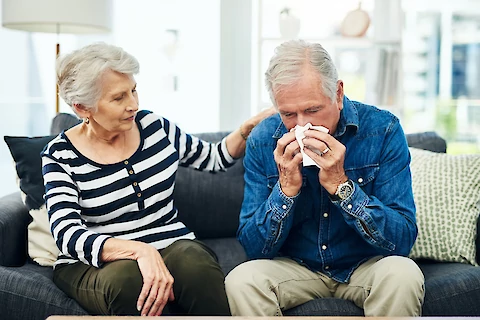
As the leaves start to change color and the crisp autumn air sets in, it's not just pumpkin spice lattes and cozy sweaters we have to look forward to. Fall also brings with it a flurry of allergens that may wreak havoc on our health, particularly for seniors. In this blog, we'll share helpful tips and practical advice on limiting exposure and managing allergy symptoms, enabling seniors to enjoy the beauty of fall without worry.
Understanding Autumn Allergens
Autumn is a prime time for allergens such as dust mites and ragweed pollen. Dust mites thrive in warm, humid environments and find solace in our homes as we start to bundle up and crank up the heat. On the other hand, ragweed pollen, released from late summer until the first frost, peaks during the fall season, resulting in some sniffling noses and watery eyes.
Why Seniors Are More Susceptible to Autumn Allergens
As we age, our immune system becomes less effective, leaving seniors more susceptible to allergens. The sensitivity can cause the immune system to overreact, thereby triggering an allergic reaction. Also, certain medications for chronic diseases can alter the body's response to allergens, making the reactions more severe.
Tips to Limit Exposure to Autumn Allergens Indoors
Indoor allergens can be tricky to handle. Start by reducing dust mites in your living space. A thorough cleaning, washing bedding in hot water, and using allergen-proof mattresses and pillow covers can help. To improve indoor air quality, consider using a high-efficiency particulate air (HEPA) filter, which can catch allergens in the air.
Tips to Limit Exposure to Autumn Allergens Outdoors
When it comes to combating outdoor allergens, knowledge is power. Keep an eye on local pollen counts and plan outdoor activities accordingly. Dressing appropriately can also shield you from allergens. Long sleeves, sunglasses, and even a wide-brimmed hat can limit exposure. Remember, allergens can stick to clothes and hair, so a quick shower after coming indoors can wash away any hitchhiking pollen.
When to Consult a Healthcare Provider
While these tips can be helpful, allergies can sometimes be hard to manage alone. If symptoms persist, escalate or start to interfere with daily life, it's time to consult a healthcare provider. They can provide personalized advice and treatment options, ensuring the best care for your respiratory health and overall well-being during this season change.
Discover Premium Senior Care Solutions
Living with allergies can be challenging, but the right strategies can make the autumn season enjoyable for everyone. By understanding allergens, taking proactive measures, and seeking medical help when necessary, seniors can enjoy the beauty of fall without the distress of allergy symptoms.
If you, or a loved one in Charlottesville, Harrisonburg, Bridgewater, Gordonsville, or Crozet could use extra assistance mitigating allergen exposure or any other aspects of senior care this autumn, contact us. Our team at Senior Helpers Blue Ridge is committed to providing high-quality, personalized care for you or your senior loved ones.